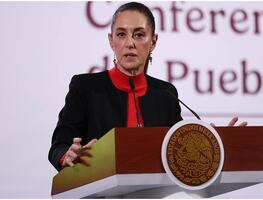Más Información

Gertz Manero: No vamos a soltar el caso de “El Mayo” Zambada; siguen vigentes órdenes contra García Luna en México

García Harfuch resalta contención en escalada de homicidios en Sinaloa; en Culiacán, en 3 meses, ha sido de 35%, dice
Air pollutants contribute to the development of obstructive pulmonary diseases related to smoking; continued exposure to such emissions may increase about 10% the chance of developing lung cancer, said Horacio Riojas, Director of the Department of Environmental Health of the National Institute of Public Health (INSP).
In an interview with El Universal, the expert explained that the chances of developing lung cancer depend on individual conditions, such as how long the person has lived in a city, as well as levels of pollutants concentrations to which the person has been exposed.
Given the increase of air pollution levels in Mexico City in recent weeks, Riojas appealed to the population to follow the recommendations of the authorities and work together to reduce pollution levels, he also explained that air pollutants have acute and chronic health effects.
Eye irritation, headache or respiratory infections, are the most common acute effects; however, among the chronic effects a connection between the effect of pollutants and the lung development of children has been found: "As long as children are exposed to high concentrations of pollutants, their full lung development can't be completed, on the other hand, adults can develop chronic lung diseases."
Children with asthma are more likely to experience a crisis when there is environmental contingency, because "the risk of going to the emergency room increases between 20% and 40%," he said.
As for vulnerable groups such as pregnant women and elderly people, he explained that they are at risk of suffering complications "pregnant women decrease the amount of oxygen for the fetus and that can cause developmental effects; in the elderly, especially those with lung or heart disease, the complications can lead to death."
He added that currently the connection between pollutants and the development of some cerebrovascular diseases such as stroke is being studied.
He also urged people to follow the recommendations and to be part of the solution by reducing car use. He acknowledged that the “Hoy No Circula” (No Circulation Today Program) will not solve the problem.
"I understand that some people are upset because the “Hoy No Circula” will not solve the whole problem of air pollution, we also need medium and long-term measures, such as improving public transportation, "he said.








